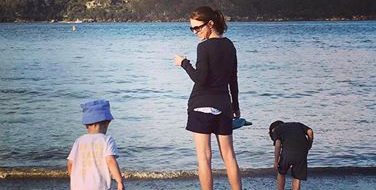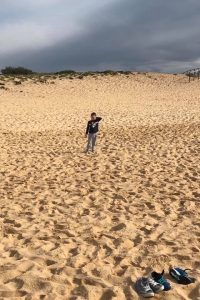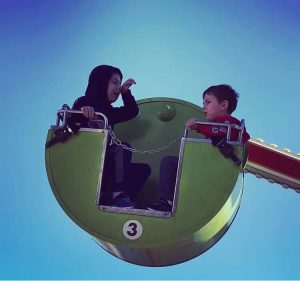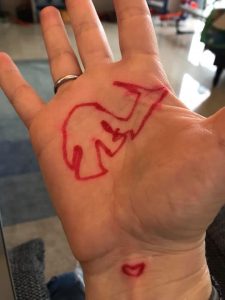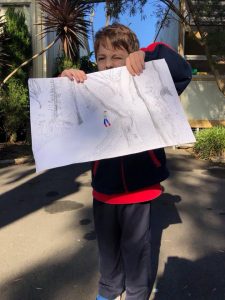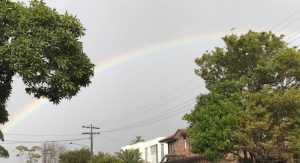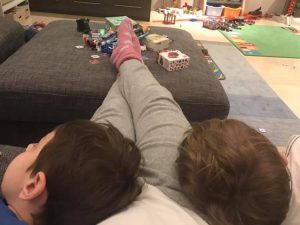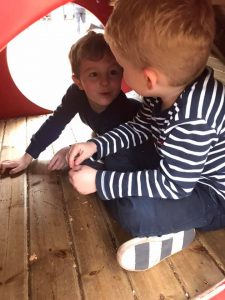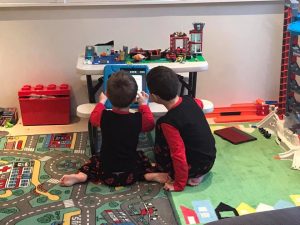
Love is real only when a person can sacrifice himself for another person. Only when a person forgets himself for the sake of another, and lives for another creature, only this kind of love can be called true love, and only in this love do we see the blessing and reward of life. This is the foundation of the world. –Leo Tolstoy
I am sitting in the waiting room of a psychologist’s office while she assesses my son, who last had this done at the age of three, when he was preverbal and the doctor who saw him insisted he was uncooperative when it turned out–later, all over the carpet–that he was actually sick. Now, four-and-a-half years later, the decision we wait for doesn’t affect diagnosis-building or schooling, but residency; specifically, whether we attain permanent residency here in Australia. I wait, type, breathe, and pray, having once again–after so many times doing it–handed my kid off to another adult for safekeeping, for poking and prodding, while I can just…sit.
It’s impossible.
The whole thing is, really, this motherhood thing. The letting go and clinging, the giving and holding back, the constant push and pull of it all. “Two things I love more than anything in the world,” a friend sent me in a meme recently, “(1) being with my kids and (2) not being with my kids.”
My first inkling of the impossibility of it all, the kind not recorded and prescribed for in parenting books, was when the nurse on the maternity ward came in and told me that The Kid had not passed his hearing test and would have to repeat it. He was in the nursery at the time, and I sat in the room after she left and cried–my tiny newborn, helpless and struggling to hear it seemed, and the thought of it broke my hormone-addled heart. How would I survive the slings and arrows he would face when the thought of a hearing test wrecked me just a few days in?
Between him and Little Brother, in the days of waiting for a second positive test and feeling the emptiness of the fourth seat at the table, the second positive came but the blood tests didn’t match up with the numbers needed for viability. I clung to hope, clung to the idea of TK’s sibling just beginning within me, clung to this dream that had yet to be confirmed, and when the doctor called to tell me that the dream was not coming true this time, I hung up and climbed, crying, into the shower. It was only then, after weeks of spotting, that I truly let go–in every way. My body released what it had been holding, and my tears washed it all down, the drain spinning my hope away.
Only after they were both born, both breathing beside me, did I actually take a moment to stop and notice that this white-knuckling through life wasn’t good for them, or me. That this anxiety I had carried since childhood was now blooming on their behalf, flourishing so rapidly I often had trouble catching my breath. This was when I knew that the waiting and praying and breathing, that the counselling, it all needed backup, and I traded one pill–the kind meant to pass through me to LB to provide brain-building vitamins–for another, the kind that would keep me from white-knuckling my way through their lives, and mine.
And after we moved across the world, and I got them settled beside me, once again I realised I needed a bit more help, so my dosage went up. Then everything else settled, and I backed off the pills, taking them every other day, and I didn’t jump off any cliffs. So I officially bought into the lower dosage with a new prescription, proudly clutching it as I exited the pharmacy. Then I started forgetting to take it, and I thought: I weaned myself off allergy meds; maybe I can wean myself off this too!
It did not work.
The white-knuckling returned, the 3-am wakeup calls of fear, the tension headaches, the shortness of breath. In a way, it was nice–to show me where I’d been. I wondered…should I just wait? Until my next cycle was over, until school and its third term settled back into a rhythm, until this or that passed? Then it was no longer nice. I was no longer able to find silver linings. I was fighting to keep my head above water, and with two small people attached to me. It was impossible, but it didn’t have to be.
So I set the pills back on my countertop where I wouldn’t forget them, and I returned to the daily routine of them, and I emailed my OG counsellor, the one whose file on me is THICK but full of grace, to ask if he did Skype sessions, and he said he would. And my knuckles began to release a bit, to be less…white all the time. And I breathed.
“A sword will pierce your own soul,” an old man in a temple told the mother of God, and he may as well have been speaking it through the halls of time to every mother who ever lived. This tension, of taking care of ourselves and others, of constantly going against advice by putting on the kids’ oxygen mask first because we can’t imagine any other way, it is impossible. No one tells you these things in the books: how many conversations you will have from the toilet, and how utterly impossible it is to be a mother. It’s nonsensical. It’s unbearably difficult. And if it isn’t, I humbly submit that it’s…not being fully done. It is the rock, and the hard place.
But. Help comes. In the form of a pill. In the form of a counsellor. In the form of like-minded friends. Of partners who show up. Of wine, and bread, and tables. Of eyelashes fringing closed lids, catching the light of a Mario Brothers lamp in an as-yet unseen way so that you know, you just know, that there are still things that will be brand new and true, always, even after mornings when you would have been detained had child services peeked in.
And some days it will be the difference between holding on and letting go and the impossible balance between them, but you try to remember that when you are yourself, the right people will show up. The right help will show up. Like Dumbledore told Harry, like you tell your children. Then one of them, just as you are sneaking away to watch Netflix, murmurs through his sleep, “Stay next to me.” You want to, and you don’t want to, so for just a moment, and forever…you do.
